The RHSP Legal Section
The Legal Section at the Rakai Health Sciences Program (RHSP) is a cornerstone of our organizational infrastructure, providing essential legal support and ensuring compliance with laws and regulations.
Grants & Finance Department
The Finance and Grants department at the Rakai Health Sciences Program (RHSP) is integral to our mission of financial integrity, accountability, and excellence. Managing over 13 grants and contracts totaling more than USD 3,200,000 annually, our team ensures meticulous financial oversight to support our diverse projects aimed at combating HIV/AIDS and promoting health equity.
Team Composition and Expertise
Our department is staffed by certified accountants with extensive experience in non-profit financial management. They continuously update their skills to stay abreast of the latest financial regulations, best practices, and technological advancements, ensuring our financial operations are both efficient and compliant.
Automated Financial Management System
An advanced automated financial management system underpins our financial operations, offering features such as:
- Real-Time Financial Reporting which provides immediate updates on transactions for quick decision-making.
- Budgeting and Forecasting which enables precise financial planning and efficient resource allocation.
- Compliance Monitoring which ensures adherence to internal policies and IFRS.
- Audit Trail which maintains a comprehensive record of all transactions for accountability and transparency.
Financial Management of Grants and Contracts
Our processes ensure each project is funded appropriately, expenses are tracked accurately, and reports are generated timely.
We follow multiple processes to ensure Grant and Contract Acquisition and fund allocation, segregation and management as well as expenses management. We also ensure periodic reviews and meticulous record keeping, ensuring effective management.
Financial Reporting
We follow multiple reporting mechanisms which provide snapshots of the project finances as well as enabling us to meet funder requirements. We conform to International Financial Reporting Standards (IFRS) while operating under tight internal controls and subject to rigorous audits by international audit firms.
Our current auditors are Diamond Consulting Group (Internal Audit) and Ernst & Young (External Audit). In addition, the RHSP Executive management (Board) has a standing audit committee to oversee the finances and grants management.
Policy Framework
We have favorable financial policies which govern all aspects of financial management, including procurement and expense authorization. These internal controls prevent fraud through segregation of duties, regular reconciliations, and authorization protocols. We also ensure compliance monitoring through various channels and techniques.
Conclusion
The Finance and Grants department at RHSP is crucial to our organization’s success. With meticulous planning, rigorous internal controls, and advanced technology, we ensure effective financial management. Our commitment to transparency, accountability, and compliance supports our efforts to combat HIV/AIDS and promote health equity. As we expand our programs and impact, our Finance and Grants department will continue to provide the financial foundation necessary to achieve our mission.

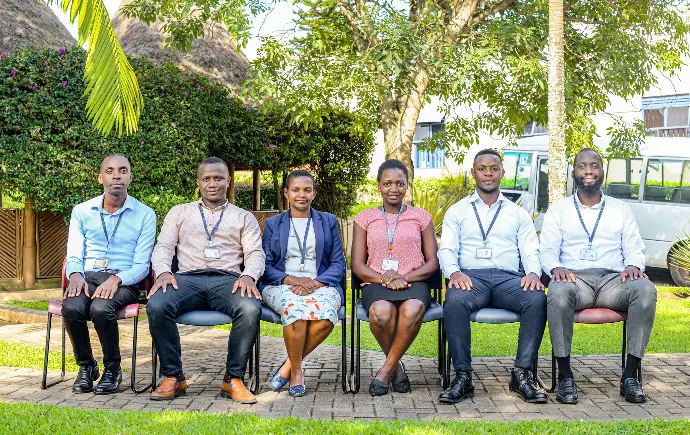
The RHSP Warehouses: Ensuring Seamless Operations through Efficient Logistics Management
The Logistics Department at Rakai Health Sciences Program (RHSP) plays a critical role in supporting the organization's mission to improve public health through high-impact research and quality healthcare services. The department's responsibilities encompass a wide range of activities, including procurement, inventory management, warehousing, and transportation. By ensuring the efficient and effective management of logistics operations, the department helps maintain a seamless supply chain that supports the diverse needs of RHSP’s projects and programs.
Warehousing and Inventory Management
The RHSP Warehouses serve as the backbone of the organization's logistics operations, managing all aspects of inbound, outbound, and reverse logistics. The Stores Department coordinates the receipt, storage, issuance, and returns management of goods to ensure seamless supply chain operations. Key aspects of warehousing and inventory management include:
- Receipt of Goods: The logistics team oversees the receipt of goods, ensuring that all items are checked for quality and quantity against purchase orders. This process involves meticulous documentation and verification to maintain accuracy and accountability.
- Storage Solutions: Efficient storage solutions are implemented to maximize space utilization and ensure the safekeeping of goods. This includes the use of shelving, pallets, and climate-controlled storage for temperature-sensitive items.
- Inventory Control: The department employs robust inventory control systems to track stock levels, monitor expiry dates, and manage stock rotations. This helps prevent stockouts and overstocking, ensuring that essential supplies are always available when needed.
- Issuance and Distribution: Goods are issued to various departments and project sites based on approved requisitions. The logistics team ensures timely and accurate distribution to support ongoing activities and minimize disruptions.
- Returns Management: The department handles the return of damaged or excess goods, coordinating with suppliers for replacements or refunds. This process includes proper documentation and adherence to return policies to maintain accountability and reduce losses.
Procurement and Supply Chain Coordination
Effective procurement is essential for ensuring that RHSP has the necessary resources to achieve its objectives. The logistics department works closely with the procurement team to coordinate the acquisition of goods and services. Key procurement activities include:
- Vendor Management: Establishing and maintaining relationships with reliable vendors is crucial for securing high-quality goods and services at competitive prices. The logistics department collaborates with the procurement team to evaluate vendors, negotiate contracts, and ensure timely deliveries.
- Order Processing: The logistics team processes purchase orders, ensuring that all necessary approvals are obtained and that orders are placed accurately and efficiently. This includes coordinating with vendors to confirm delivery schedules and resolving any issues that may arise.
- Supply Chain Optimization: The logistics department continuously seeks ways to optimize the supply chain, from sourcing to delivery. This includes identifying potential cost savings, improving lead times, and enhancing overall efficiency.
Reverse Logistics and Sustainability
RHSP is committed to sustainability and environmental stewardship. The logistics department plays a key role in implementing sustainable practices and managing reverse logistics. Key activities include:
- Waste Management: The department oversees the disposal of waste materials, ensuring that they are handled in an environmentally responsible manner. This includes recycling programs, proper disposal of hazardous materials, and minimizing waste generation.
- Returns and Recycling: The logistics team manages the return of unused or obsolete items, coordinating with suppliers for recycling or repurposing. This helps reduce waste and supports RHSP's commitment to sustainability.
- Energy Efficiency: The department seeks to minimize the environmental impact of logistics operations by implementing energy-efficient practices. This includes using fuel-efficient vehicles, optimizing transportation routes, and exploring renewable energy options for warehouses and facilities.
Collaboration and Integration
The success of the logistics operations at RHSP relies on strong collaboration and integration with other departments. The logistics team works closely with the Finance and Grants Department, Human Resources, and other key stakeholders to ensure that logistics activities align with organizational objectives. Key collaboration activities include:
- Financial Coordination: The logistics department works with the Finance and Grants Department to manage budgets, track expenditures, and ensure compliance with financial regulations. This includes preparing financial reports, managing grant funds, and participating in audits.
- Human Resources Support: The logistics team supports HR initiatives by providing transportation for staff, managing the movement of goods for events, and ensuring that staff have the resources they need to perform their duties effectively.
- Project Integration: The logistics department collaborates with project teams to understand their specific needs and provide tailored support. This includes coordinating the delivery of project supplies, managing inventory for project sites, and supporting field activities.
Commitment to Excellence
The Logistics Department at RHSP is dedicated to providing exceptional service and support to ensure the smooth operation of the organization's activities. By prioritizing efficiency, sustainability, and collaboration, the department contributes to RHSP's mission of improving public health and delivering high-impact research and healthcare services. Key commitments include:
- Continuous Improvement: The department is committed to continuously improving its processes and operations. This includes regular evaluations, adopting best practices, and leveraging technology to enhance efficiency.
- Stakeholder Engagement: Engaging with stakeholders is essential for understanding their needs and providing effective support. The logistics team maintains open communication with internal and external stakeholders to ensure alignment and responsiveness.
- Quality Assurance: Ensuring the highest standards of quality in all logistics activities is a priority. The department implements rigorous quality control measures to maintain the integrity and reliability of the supply chain.
In conclusion, the Logistics Department at RHSP plays a vital role in supporting the organization's mission by ensuring the efficient and effective management of logistics operations. Through comprehensive warehousing and inventory management, strategic procurement, reliable transportation, and sustainable practices, the department helps maintain a seamless supply chain that supports the diverse needs of RHSP’s projects and programs. By fostering collaboration, prioritizing stakeholder engagement, and committing to continuous improvement, the logistics team contributes to the overall success and sustainability of RHSP's operations.

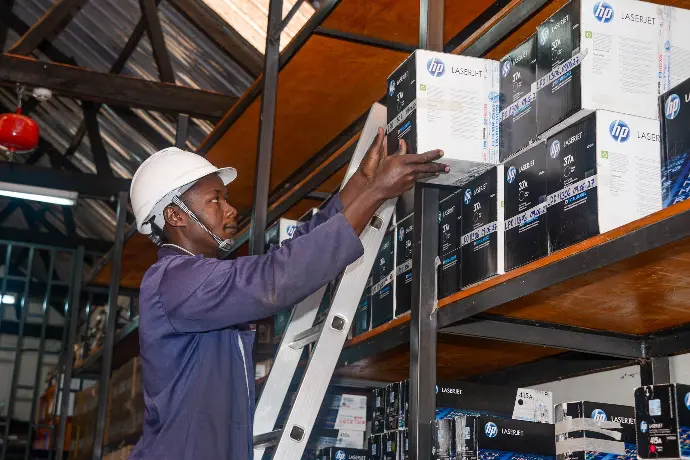
Ensuring Compliance & Mitigating Risk
The Legal Section at the Rakai Health Sciences Program (RHSP) is a cornerstone of our organizational infrastructure, providing essential legal support and ensuring compliance with laws and regulations. This department is pivotal in mitigating risks, managing contracts, overseeing compliance, resolving disputes, and fostering a legally sound environment that aligns with our mission to promote health equity and combat HIV/AIDS. The Legal Section operates through a strategic partnership between in-house counsel and external law firms, offering comprehensive legal services and access to specialized expertise.
Legal Consultation and Advice
The Legal Section serves as the go-to resource for all legal inquiries within RHSP, providing day-to-day legal consultation and advice. The scope of legal matters addressed by the department includes, but is not limited to:
- Contract Management which includes drafting, reviewing, and managing contracts to ensure they meet legal standards and organizational policies.
- Compliance Issues where the team provides advice on regulatory requirements and organizational policies to ensure adherence.
- Dispute Resolution through offering guidance and strategies for resolving conflicts that may arise.
- Legal Transactions where they oversee various legal transactions to ensure they are conducted within the legal framework.
By offering timely and accurate legal advice, the Legal Section helps RHSP navigate complex legal landscapes, enabling the organization to focus on its core mission without legal impediments.
Contract Management
Contract management is a critical function of the Legal Section. The department is responsible for the entire lifecycle of contracts, from drafting and negotiation to execution and monitoring. Key activities in contract management include:
- Drafting Contracts: Creating contracts that clearly outline the terms and conditions, ensuring they are fair and legally binding.
- Review and Approval: Thoroughly reviewing contracts to identify potential legal issues and ensure compliance with legal standards and organizational policies.
- Risk Mitigation: Assessing and mitigating risks associated with contractual agreements to protect RHSP’s interests.
- Monitoring Compliance: Ensuring that all parties adhere to the contractual terms and addressing any breaches promptly.
Effective contract management safeguards RHSP from potential legal disputes and financial losses, ensuring that all agreements align with the organization’s strategic objectives and legal requirements.
Compliance Oversight
Ensuring compliance with applicable laws, regulations, and internal policies is a core responsibility of the Legal Section. Compliance oversight involves:
- Regulatory Monitoring: Staying abreast of changes in laws and regulations that impact RHSP’s operations.
- Policy Development: Collaborating with other departments to develop and implement policies that promote compliance.
- Training and Education: Providing training sessions and resources to staff on compliance-related topics.
- Internal Audits: Conducting regular audits to ensure adherence to legal and policy requirements and identifying areas for improvement.
Proactive compliance oversight helps maintain RHSP’s integrity and reputation, preventing legal issues that could disrupt operations and harm the organization’s standing.
Dispute Resolution
Legal disputes can arise from various aspects of RHSP’s operations. The Legal Section plays a crucial role in resolving these disputes through:
- Negotiation: Facilitating negotiations between parties to reach amicable settlements.
- Mediation: Using mediation techniques to resolve conflicts without resorting to litigation.
- Litigation: Representing RHSP in court when necessary, advocating for favorable outcomes.
- Legal Representation: Ensuring RHSP’s interests are well-represented in all legal proceedings.
By employing a range of dispute resolution strategies, the Legal Section aims to resolve conflicts efficiently and effectively, minimizing disruptions to RHSP’s activities.
Risk Mitigation
Identifying and mitigating legal risks is essential for protecting RHSP’s interests. The Legal Section undertakes various risk mitigation activities, including:
- Risk Assessments: Conducting thorough assessments to identify potential legal risks.
- Strategic Planning: Developing strategies to minimize legal exposure and address identified risks.
- Policy Implementation: Establishing policies and procedures that reduce the likelihood of legal issues.
- Ongoing Monitoring: Continuously monitoring legal developments and organizational activities to preemptively address risks.
- Effective risk mitigation ensures that RHSP can operate within a safe and secure legal framework, allowing the organization to pursue its goals with confidence.
Collaborative Approach
The Legal Section operates through a collaborative approach, leveraging the strengths of both in-house counsel and external law firms. This partnership ensures comprehensive legal support, combining the internal team’s deep understanding of RHSP’s operations with the specialized expertise of external legal professionals. Key aspects of this collaboration include:
Conclusion
The Legal Section at RHSP is indispensable in ensuring legal compliance, mitigating risks, and facilitating the institution’s objectives. By providing timely and strategic legal advice, managing contracts, overseeing compliance, resolving disputes, and mitigating risks, the department contributes significantly to the overall success and sustainability of RHSP’s operations. The collaborative approach between in-house counsel and external law firms enhances the department’s capacity to address complex legal issues, ensuring that RHSP operates within a secure and compliant legal framework. As RHSP continues to expand its programs and impact, the Legal Section remains committed to providing the legal foundation necessary to support the organization’s mission and goals.

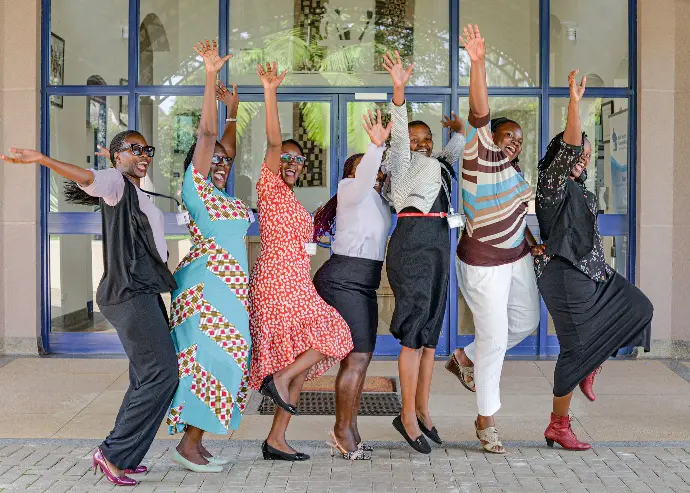
Fleet Management and Transport at RHSP: Driving Excellence
Fleet Management plays a crucial role in ensuring the seamless mobility of Rakai Health Sciences Program (RHSP) employees as they deliver essential services to communities across southwestern Uganda and beyond. With a fleet of over 50 automobiles, meticulously maintained and serviced by an in-house team of experts, RHSP prioritizes the efficiency and effectiveness of its transport operations. This comprehensive approach ensures that our team can meet the health needs of the population promptly and safely.
Core Objectives
Seamless Mobility
The primary objective of RHSP’s Fleet Management is to facilitate the smooth movement of personnel, ensuring they can reach their destinations without delay and safely. By maintaining a reliable fleet of vehicles, our transport team supports the organization’s service delivery efforts in the following ways:
- Reliable Fleet: Our fleet is composed of well-maintained vehicles that are regularly serviced by our in-house team of mechanics. This ensures that our vehicles are always in top condition, minimizing the risk of breakdowns and delays.
- Prompt Service Delivery: With a dependable fleet, RHSP staff can reach remote and underserved areas efficiently, ensuring that healthcare services are delivered in a timely manner.
- Safety: The safety of our staff is paramount. Our vehicles are equipped with necessary safety features, and drivers are trained in safe driving practices to prevent accidents and ensure the well-being of passengers.
Customer Centricity
Fleet Management is committed to achieving high levels of customer satisfaction by continuously improving its services. By listening to feedback and adapting to the needs of RHSP staff, the team ensures that transportation services meet the highest standards.
Enhancing Work Experience
Fleet Management at RHSP is dedicated to enhancing the work experience and impact of our staff by providing reliable and comfortable transportation services. This dedication contributes to a positive work environment and overall staff satisfaction. Key aspects include:
- Comfortable Transportation: We understand the demands of our staff’s work and aim to make their travel as comfortable as possible. Our vehicles are chosen and maintained with comfort in mind, allowing staff to arrive at their destinations ready to perform their duties effectively.
- Staff Satisfaction: By prioritizing the comfort and reliability of our transport services, we contribute to higher staff morale and satisfaction, which in turn improves productivity and the quality of services delivered.
- Supportive Environment: Providing excellent transportation services demonstrates our commitment to supporting our staff, ensuring they feel valued and appreciated.
Efficiency and Cost-Effectiveness
Fleet Management identifies and implements safer, faster, and more cost-efficient ways to provide transportation services. By optimizing routes and reducing operational costs, we maximize efficiency without compromising on quality. Our focus on efficiency includes:
- Route Optimization: We use advanced planning tools to determine the most efficient routes for our vehicles. This reduces travel time and fuel consumption, leading to cost savings and faster service delivery.
- Cost Management: By carefully managing maintenance schedules and operational costs, we ensure that our fleet operates within budget while maintaining high standards of service.
- Innovation: We continuously explore new technologies and methods to improve our transport operations. This includes adopting eco-friendly practices and leveraging data analytics to enhance efficiency.
Teamwork and Integrity
Fleet Management at RHSP fosters a culture of teamwork, respect, and integrity within the department. By promoting open communication, positive attitudes, and ethical behavior, we maintain healthy internal relations and inspire trust among RHSP staff. Our commitment to these values is demonstrated through team collaboration, mutual respect and integrity and open communication across the team.
Comprehensive Maintenance
Maintaining our fleet in top condition is a top priority. Our in-house team of skilled mechanics ensures that every vehicle is regularly serviced and inspected. This proactive maintenance approach includes:
- Regular Servicing: Scheduled maintenance checks are conducted to keep vehicles in optimal condition, preventing breakdowns and extending the lifespan of the fleet.
- Inspections: Routine inspections help identify and address potential issues before they become major problems, ensuring safety and reliability.
- Repairs: Any necessary repairs are carried out promptly by our expert team, minimizing downtime and keeping the fleet operational.
Environmental Responsibility
We are committed to reducing our environmental footprint through sustainable fleet management practices. Our efforts include:
- Eco-Friendly Vehicles: Where possible, we incorporate vehicles with lower emissions and better fuel efficiency into our fleet.
- Sustainable Practices: Implementing practices that reduce waste and promote environmental sustainability, such as recycling and using eco-friendly products.
- Awareness: Raising awareness among staff about the importance of environmental responsibility and encouraging sustainable behaviors.
Conclusion
The Fleet Management and Transport team at RHSP is dedicated to ensuring the seamless mobility of our employees, enhancing their work experience, and supporting the delivery of essential services to communities. By maintaining a reliable fleet, prioritizing customer satisfaction, optimizing efficiency, fostering teamwork, and upholding the highest standards of integrity, we play a vital role in the success of RHSP’s mission. Our comprehensive approach to fleet management not only supports the operational needs of the organization but also contributes to a positive and productive work environment, ensuring that our team can continue to make a meaningful impact on the health and well-being of the communities we serve.
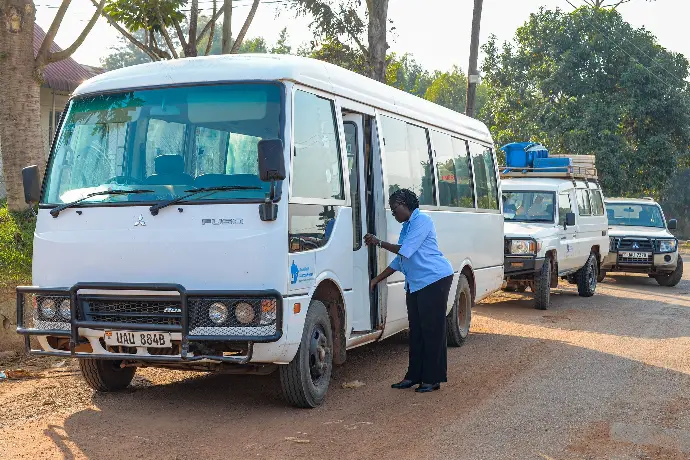

Empowering Our Greatest Asset at RHSP: Human Resources
At Rakai Health Sciences Program (RHSP), we recognize that our people are our most valuable asset. The success of RHSP hinges on the significant contributions of our employees, and as such, we prioritize the engagement of individuals with the right knowledge, skills, and talent. The Human Resources (HR) Office at RHSP is dedicated to maintaining a positive working environment characterized by inclusivity, diversity, and a shared set of values. Our comprehensive approach to human resources management includes talent acquisition, fostering organizational culture, career development, employee engagement, and compensation and rewards.
Core Objectives
Talent Acquisition
The HR Office focuses on recruiting and selecting high-quality candidates who align with RHSP's mission and values. By ensuring that the right people are engaged, we drive excellence and innovation within the organization. Our talent acquisition process includes:
- Strategic Recruitment: We implement strategic recruitment processes to attract top talent from diverse backgrounds. This involves proactive outreach, partnerships with educational institutions, and leveraging digital platforms to reach a wider audience.
- Rigorous Selection: Our selection process includes multiple stages of evaluation to ensure that candidates not only possess the required skills but also fit well with our organizational culture. This includes comprehensive interviews, assessments, and reference checks.
- Onboarding: We provide a thorough onboarding program to help new employees integrate smoothly into the organization. This includes orientation sessions, mentorship programs, and training on RHSP’s policies, procedures, and values.
By focusing on strategic recruitment and thorough onboarding, we ensure that RHSP is equipped with a team of professionals who are dedicated to our mission of improving public health.
Organizational Culture
RHSP fosters a great organizational culture centered around shared values such as Innovation, Integrity, Collaboration, Teamwork, and being People-centered. By promoting inclusivity and diversity, we create a work environment where every individual feels valued and empowered. Our efforts to cultivate a positive organizational culture include:
- Values and Principles: We emphasize our core values in all aspects of our operations. These values guide our decision-making processes and interactions, creating a cohesive and supportive work environment.
- Inclusivity and Diversity: We are committed to creating a diverse and inclusive workplace. This involves promoting equal opportunities, implementing anti-discrimination policies, and celebrating the diverse backgrounds and perspectives of our employees.
- Communication and Transparency: Open communication and transparency are essential to our organizational culture. We encourage regular feedback, hold town hall meetings, and ensure that employees are informed about organizational developments and decisions.
By fostering a culture of inclusivity, diversity, and shared values, we create a supportive and dynamic work environment that drives employee satisfaction and productivity.
Career Development
RHSP is committed to the professional growth and development of its employees. Through identifying and meeting training needs, we equip staff with the skills and knowledge necessary to excel in their roles and contribute to the organization's success. Our career development initiatives include:
- Training Programs: We offer a wide range of training programs, including workshops, seminars, and online courses. These programs cover various topics, from technical skills to leadership development, ensuring that employees have the tools they need to succeed.
- Mentorship and Coaching: We provide mentorship and coaching opportunities to help employees navigate their career paths and achieve their professional goals. Experienced mentors offer guidance, support, and advice, fostering a culture of continuous learning.
- Performance Management: Our performance management system includes regular evaluations, feedback sessions, and goal-setting exercises. This helps employees understand their strengths and areas for improvement and aligns their personal goals with the organization’s objectives.
By investing in career development, we empower our employees to grow professionally and contribute to the long-term success of RHSP.
Employee Engagement
Building a sense of belongingness and camaraderie is essential for maintaining a positive workplace culture. RHSP conducts team building events and supports social welfare activities to foster strong bonds among employees and promote a supportive work community. Our employee engagement initiatives include:
- Team Building Activities: We organize regular team building activities, such as retreats, sports events, and social gatherings. These activities help strengthen relationships among employees and promote teamwork and collaboration.
- Social Welfare Programs: We support various social welfare programs that benefit both our employees and the broader community. This includes initiatives such as health camps, community service projects, and employee wellness programs.
- Employee Feedback: We actively seek and value employee feedback through surveys, suggestion boxes, and regular meetings. This feedback helps us understand employee needs and make informed decisions to improve the workplace environment.
By prioritizing employee engagement, we create a positive and supportive work environment that enhances job satisfaction and performance.
Compensation and Rewards
Recognizing and rewarding employee contributions is integral to maintaining high levels of motivation and performance. RHSP offers a competitive compensation and rewards program tailored to the unique needs and preferences of its employees. Our compensation and rewards strategy includes:
- Competitive Salaries: We offer competitive salaries that are regularly reviewed and adjusted to reflect market trends and employee performance. This ensures that our employees are fairly compensated for their contributions.
- Performance-Based Incentives: We provide performance-based incentives, including bonuses and merit increases, to recognize and reward exceptional performance. This motivates employees to strive for excellence in their roles.
- Comprehensive Benefits: Our benefits package includes health insurance, retirement plans, and other perks such as paid time off, flexible working arrangements, and professional development opportunities.
By offering a comprehensive and competitive compensation and rewards program, we attract and retain top talent, ensuring the long-term success of RHSP.
Commitment to Excellence
At RHSP, we are dedicated to improving public health through high-impact research, informed policymaking, and the provision of quality health services. Our commitment to excellence extends to every aspect of our operations, including our approach to human resources management. The HR Office at RHSP plays a vital role in driving organizational success by ensuring that the right people are engaged, fostering a positive work culture, supporting employee development, and recognizing employee contributions.
Through these efforts, RHSP remains committed to its mission of improving community health and welfare through high-impact research and service delivery. By prioritizing the engagement and development of our employees, we ensure that RHSP continues to be a leader in public health and research, making a meaningful impact on the communities we serve.

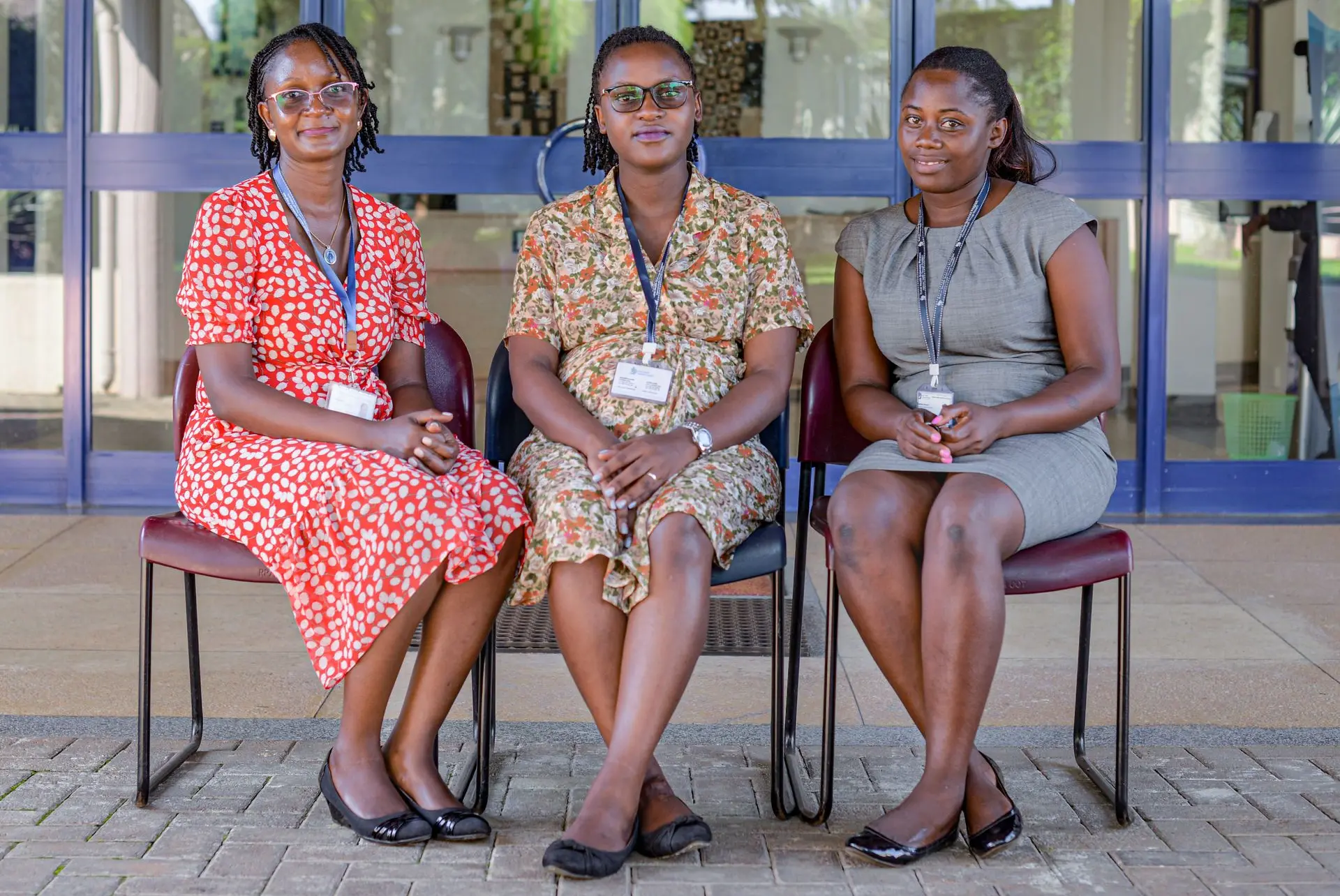
Ensuring Excellence in Facility Management and Environmental Stewardship through the Estates Department
The Estates Department plays a pivotal role in supporting the Rakai Health Sciences Program’s (RHSP) mission by ensuring a safe, efficient, and well-maintained environment for patients, staff, and visitors. Our commitment to upholding the highest standards of facility management and environmental stewardship is rooted in the understanding that these elements directly impact the well-being of our community and the success of our research and healthcare initiatives. Our comprehensive approach encompasses facility maintenance and optimization, sustainable practices, project management and development, an expert team, and seamless collaboration with other RHSP directorates.
Facility Maintenance and Optimization
At the heart of the Estates Department’s responsibilities is the provision of comprehensive maintenance and repair services for all RHSP facilities. This includes:
- Building and maintenance of Infrastructure: We ensure the structural integrity and aesthetic upkeep of all buildings. Regular inspections and preventive maintenance routines are carried out to address issues before they become significant problems, thereby minimizing disruptions to essential services.
- Engineering Systems: Our team maintains and optimizes various engineering systems, including electrical, plumbing, heating, ventilation, and air conditioning (HVAC) systems. Proper functioning of these systems is crucial for creating a comfortable and safe environment for both patients and staff.
- Vital Patient-Connected Equipment: We understand the critical role that medical equipment plays in patient care. Our proactive maintenance approach ensures that all patient-connected equipment is functioning at optimal levels, thereby supporting the delivery of high-quality healthcare services.
By prioritizing facility maintenance and optimization, we contribute to the smooth operation of RHSP’s healthcare and research activities, ensuring that our facilities are always ready to meet the needs of our community.
Sustainable Practices
Environmental stewardship is a core value of the Estates Department. We are committed to minimizing our environmental footprint through the implementation of sustainable practices. These include:
- Responsible Waste Management: We have established robust waste management protocols to ensure the safe and environmentally friendly disposal of medical, hazardous, and general waste. By reducing, reusing, and recycling waste wherever possible, we aim to minimize our impact on the environment.
- Water Conservation Efforts: Recognizing the importance of water as a precious resource, we have implemented various water conservation measures. These include the installation of water-efficient fixtures and systems, as well as the promotion of water-saving practices among staff and visitors.
- Integration of Renewable Energy Sources: We are progressively integrating renewable energy sources, such as solar power, into our energy mix. This not only helps reduce our carbon footprint but also enhances the resilience and sustainability of our energy supply.
Through these sustainable practices, we strive to create a healthier environment for our community and contribute to global efforts to combat climate change.
Project Management and Development
The Estates Department plays a key role in planning and executing capital projects, ensuring that new developments and improvements align with RHSP’s healthcare objectives and sustainability goals. Our approach to project management and development includes:
- Strategic Planning: We work closely with other RHSP directorates to identify and prioritize capital projects that support the organization’s strategic objectives. This includes the expansion of existing facilities, the construction of new buildings, and the upgrade of infrastructure.
- Design and Execution: Our team oversees the design and execution of projects, ensuring that they are completed on time, within budget, and to the highest standards of quality. We collaborate with architects, contractors, and other stakeholders to ensure that projects meet the specific needs of our healthcare and research activities.
- Sustainability Integration: In line with our commitment to environmental stewardship, we incorporate sustainable design principles into all new developments and improvements. This includes the use of energy-efficient materials, sustainable construction practices, and the integration of green spaces.
By managing and developing projects that enhance our facilities, we ensure that RHSP remains at the forefront of healthcare and research excellence.
Expert Team
Our team comprises skilled professionals, including engineers, technicians, and support staff, who bring a wealth of experience and dedication to their roles. The expertise and commitment of our team are central to the success of the Estates Department’s initiatives. Key aspects of our team include:
- Skilled Professionals: Our team members possess a diverse range of skills and qualifications, enabling them to effectively manage the various aspects of facility maintenance, project management, and environmental sustainability.
- Continuous Training and Development: We invest in the continuous training and development of our team to ensure that they stay abreast of the latest industry trends, technologies, and best practices. This commitment to professional growth enhances our ability to deliver high-quality services.
- Dedication and Commitment: Our team is dedicated to upholding the values and mission of RHSP. Their commitment to excellence, integrity, and collaboration ensures that we consistently meet the needs of our community and contribute to the organization’s success.
Collaboration and Integration
The Estates Department works in close collaboration with both the Human Resources and Corporate Services Directorate and the Planning and Development Directorate to ensure seamless integration of facility management with RHSP’s overall strategic objectives. This collaborative approach includes:
- Cross-Departmental Collaboration: We maintain open lines of communication and foster strong working relationships with other RHSP departments. This ensures that our facility management efforts are aligned with the broader goals and initiatives of the organization.
- Integrated Planning: By working closely with the Planning and Development Directorate, we ensure that our projects are strategically planned and executed to support RHSP’s long-term objectives. This includes aligning facility improvements with the organization’s growth and development plans.
- Support for Human Resources: Our collaboration with the Human Resources and Corporate Services Directorate ensures that our facilities provide a safe, comfortable, and supportive environment for staff. This includes addressing any facility-related concerns and supporting initiatives to enhance staff well-being.
Our Commitment
The Estates Department is dedicated to providing a supportive and sustainable environment that enables the Rakai Health Sciences Program to deliver exceptional healthcare and research services to the communities we serve. We strive for continuous improvement, innovation, and excellence in all aspects of our work. Our commitment to facility maintenance and optimization, sustainable practices, project management and development, expertise, and collaboration ensures that we play a vital role in the success of RHSP’s mission.
By upholding the highest standards of facility management and environmental stewardship, we contribute to the overall well-being of our community and the sustainability of our healthcare and research initiatives. Through our efforts, we aim to create an environment that supports the delivery of high-quality services, fosters innovation, and enhances the quality of life for our staff, patients, and visitors.
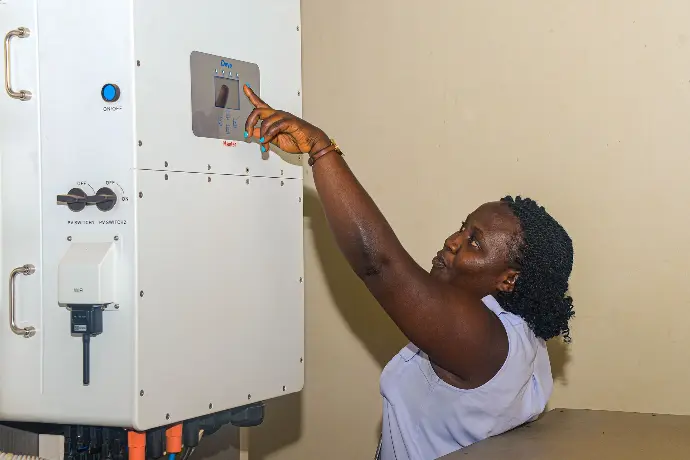

SBS Department Overview:
The Social and Behavioral Sciences department (SBS) at Rakai Health Sciences Program (RHSP) focuses on gathering and analyzing qualitative research data (non-numerical data) to understand human behavior, attitudes, beliefs, and motivations. Overall, it enriches the understanding of human behavior, informing strategic decisions, and advancing knowledge in the field of HIV through rigorous inquiry.
Aims of the department:
Exploring human experiences & social contexts beyond quantitative methods.
Using techniques like interviews, focus groups, observations, and content analysis to generate in-depth, nuanced insights for decision-making and theory-building.
Understanding the perspectives, opinions, and interpretations of individuals or groups, often involving a smaller sample size but with a deeper level of engagement.
Contributing to theory development by generating hypotheses, finding patterns, and exploring new ideas to deepen existing knowledge.
Relevance of the SBS department within RHSP.
- Design, execute, and analyze qualitative research data that address specific research questions or objectives.
- Collaborate with in country and outside research partners, quantitative researchers, interdisciplinary teams, and stakeholders to integrate qualitative insights into broader research initiatives and interdisciplinary projects.
- Offer expertise in qualitative research methods, including study design, data collection, analysis techniques, and interpretation of findings, to support the research needs of the organization, universities, and collaborators.
- Provide actionable insights and recommendations based on qualitative research findings to inform strategic decisions, program development, policy formulation, and organizational practices.
- Communicate research findings through reports, presentations, publications, and other dissemination channels to share knowledge with internal and external stakeholders, contribute to discussions, and promote evidence-based practices.
PAST AND CURRENT RESEARCH AREAS/PROJECTS (Selected)
a. Assessing dynamics of heterosexual transmission of genital bacteria and coital impact on microbiome composition/stability in the female and male genital tracts in South-central Uganda (Sex Partner study)
Objective:
(Primary): To elucidate the sexual transmission of genital bacteria and the determinants of the penile microbiome after sex.
(Secondary): To qualitatively assess study participant perspectives and overall experience with study procedures.
b. PANGEA
Qualitative research to understand sexual relationships where phylogenetic links are missing (The Missing Links)
Objective: To better understand the sexual relationships of female RCCS participants who are part of the identified incomplete phylogenetic networks that reflect likely HIV transmission.
c. WHO
Cognitive Testing of a Survey Instrument to Assess Sexual Practices, Behaviors, and Health Related Outcomes:
Objective: To Refine a Standard Instument in English and other Language Versions by testing it in a variety of Demographic Cross Sections of the General Populations, e.g older persons, persons in rural areas worldwide.
d. PANGEA
Fishing and Inland Communities – Understanding Transmission Linkages and Networks.
Objective: To gain a deeper understanding into underlying factors that drive preferential migration of people living with HIV to high prevalence Lake Victoria fishing communities, and the reasons for lower ART use among these migrating populations.
e. Baseline, Midterm and End of Project Evaluation Protocol for Masaka Regional mechanism (Program Evaluation - Mid-Term, 2021 and End Term, 2022)
Objective:
- To collect data that will inform improvement of program implementation so that services are provided more effectively and efficiently in the region and best practices shared with other IPs in the country.
- To also inform RHSP, CDC and other stakeholders about program challenges, performance gaps, progress towards achievement of set targets and program outcomes (effectiveness) in a timely manner so that implementation strategies can be maintained, scaled up or modified where necessary.
f. Impact of COVID-19 Lockdown on HIV and Reproductive, Maternal, Neonatal, and Child Health (RMNCH) Services in Masaka region, Uganda (2020)
Objective:
To assess the impact of the COVID-19 lockdown on utilization of RMNCH and HIV services, and assess experiences and coping mechanisms in order to make recommendations to mitigate the impact of this and similar health emergencies in the future.
g. Exploration of psychological distress and cross-cultural adaptation of a mental health measure for people living with HIV in Rakai, Uganda (2021)
Objective:
To explore mental health and psychosocial
issues among people living with HIV in rural Rakai
h. Structural and Social Transitions among Adolescents and young adults in Rakai (SSTAR): (2019 – 2020)
a. Nakubulwa Rosette: Research Officer
b. Isabirye Dauda: Research Officer
c. Ddaaki William: Supervisor
d. Nakyanjo neema: Head of Department
4. PARTNERS/COLLABORATION:
a. Columbia University
b. Johns Hopkins University
c. Medical Research Council
d. Makerere University
Join us in our mission to advance health research and improve public health outcomes globally.
Collaborate for Health, Innovate for Impact.